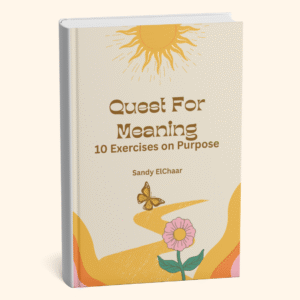In our fast-paced and often fragmented world, many people are asking deeper questions: What gives my life meaning? How can I live with more purpose? What does happiness really look like? Books on purposeful living and happiness can provide not only answers, but also guidance for navigating life with resilience and clarity.
From the existential wisdom of Viktor Frankl to modern positive psychology and neuroscience, authors across generations and disciplines have explored the link between meaning and flourishing. Below, we highlight several influential books—each offering a different doorway into purposeful living—and introduce our new Quest for Meaning ebook, which brings these ideas into daily practice.
1. Man’s Search for Meaning – Viktor Frankl

Few books have touched as many lives as Viktor Frankl’s Man’s Search for Meaning. Written in the aftermath of his imprisonment in Nazi concentration camps, the book blends memoir with psychological insight. Frankl observed that survival often depended less on physical strength and more on a sense of purpose: people who held onto love, faith, or a future goal were more resilient in the face of suffering.
From this came Logotherapy, Frankl’s therapeutic approach that centers on the “will to meaning.” Unlike Freud’s focus on pleasure or Adler’s emphasis on power, Frankl argued that meaning is humanity’s deepest motivation. His work continues to inspire readers to reflect on their values, endure hardship with dignity, and choose their attitude even when circumstances cannot be changed.
Why it matters: Frankl’s timeless insights remind us that meaning is not a luxury—it is essential for psychological survival and growth.
2. Learned Hopefulness – Dan Tomasulo

Dan Tomasulo, a leading figure in positive psychology, brings hope to the forefront in Learned Hopefulness. He argues that hope is not just a passive wish, but an active, trainable skill. Drawing on research in psychology and neuroscience, Tomasulo offers evidence-based strategies for cultivating hope through storytelling, imagery, and practical exercises.
He explains how hopeful thinking can reshape neural pathways, enabling us to shift from cycles of despair to patterns of possibility. By consciously practicing hope, we increase our ability to persevere through setbacks, envision a better future, and act with resilience in the present.
Why it matters: Hope is a psychological resource that fuels action. Tomasulo shows us how to move from helplessness toward empowerment by training our minds to expect possibility.
3. Altruism – Matthieu Ricard

Matthieu Ricard, a Buddhist monk and former molecular biologist, is widely known as “the happiest man in the world” thanks to his groundbreaking brain studies on meditation and compassion. In his work on altruism, Ricard demonstrates that kindness and empathy are not only moral virtues but also powerful drivers of well-being.
Through collaborations with neuroscientist Richard Davidson, Ricard has shown that long-term meditation on compassion produces measurable changes in the brain—strengthening regions linked to positive emotion and empathy. His research reveals that altruistic behavior can reduce stress, foster resilience, and enhance overall happiness.
Why it matters: Ricard’s work bridges science and spirituality, showing that cultivating compassion rewires the brain for greater well-being while strengthening our bonds with others.
4. Love 2.0 – Barbara Fredrickson

Barbara Fredrickson, a pioneering positive psychology researcher, reframes love in Love 2.0 as something far broader than romantic attachment. She defines love as “micro-moments of positive resonance,” small but profound experiences of connection that occur when people share joy, attention, or kindness.
Her broaden-and-build theory demonstrates how positive emotions expand our thinking, open us to new possibilities, and build lasting psychological and social resources. Fredrickson also highlights the role of the vagus nerve, which regulates calm and empathy. Positive interactions strengthen vagal tone, creating a feedback loop between emotional health, social bonds, and physical resilience.
Why it matters: Happiness isn’t built only on major milestones—it flourishes in daily moments of connection, gratitude, and presence. Fredrickson shows how small interactions can transform both health and relationships.
5. Quest for Meaning: 10 Exercises on Purpose – Sandy ElChaar (Meaningful Paths)

Our own new ebook, Quest for Meaning: 10 Exercises on Purpose, is a practical guide to bringing existential ideas into everyday life. Written by psychologist Sandy ElChaar, this workbook offers ten carefully designed exercises that help readers explore their motivations, values, and decisions.
Rather than remaining at the level of abstract theory, this resource provides hands-on tools: reflective writing prompts, guided activities, and practical scenarios that help you align daily choices with your deeper purpose. Whether you are navigating a life transition, seeking clarity in relationships, or simply longing for more fulfillment, Quest for Meaning provides a structured pathway.
Why it matters: This ebook translates existential psychology into daily action, offering practical exercises to help anyone build a purposeful life.
Why These Books Belong Together
Each of these books approaches purposeful living from a different angle:
- Frankl: Meaning is life’s ultimate motivation, even in suffering.
- Tomasulo: Hope can be learned and practiced as a daily skill.
- Ricard: Compassion transforms the brain and nurtures happiness.
- Fredrickson: Micro-moments of connection create resilience.
- ElChaar: Practical exercises bring these ideas into daily practice.
Together, they weave a rich tapestry of wisdom, blending existential insight, neuroscience, and positive psychology into a holistic understanding of purpose and well-being.
Integrating It All: The Mountain Framework & Free App
At Meaningful Paths, we draw on these insights and integrate them into our Mountain Framework, inspired by Existential Analysis founder Professor Alfried Längle. This framework guides you through:
- My Motivation – exploring what sustains you.
- My Journey – reflecting on the landscapes of your inner and outer world.
- My Decisions – making choices aligned with your values.
To make this accessible to everyone, we’ve developed the Meaningful Paths app, available free on iOS and Google Play. The app includes:
- A narrated Mountain Journey for reflective practice.
- Path Search, which matches everyday challenges with guided exercises.
- Access to our growing library of purposeful living resources.
Final Thoughts
Books on purposeful living and happiness remind us that flourishing isn’t accidental—it is cultivated through choice, reflection, and practice. Whether it is Frankl’s search for meaning, Tomasulo’s practice of hope, Ricard’s compassion, or Fredrickson’s micro-moments of connection, each perspective enriches the journey.
With Quest for Meaning: 10 Exercises on Purpose, we invite you to turn reflection into daily action, grounding your path in both science and lived experience. Paired with our Mountain Framework and app, these resources empower you to live not just a good life, but a meaningful one.
References
- Frankl, V. E. (2006). Man’s Search for Meaning. Beacon Press.
- Tomasulo, D. (2020). Learned Hopefulness. Sounds True.
- Ricard, M., Lutz, A., & Davidson, R. J. (2004). Meditation and the neuroscience of compassion. Science, 303(5663), 308–310.
- Fredrickson, B. L. (2014). Love 2.0. Plume.
- ElChaar, S. (2025). Quest for Meaning: 10 Exercises on Purpose. Meaningful Paths.

